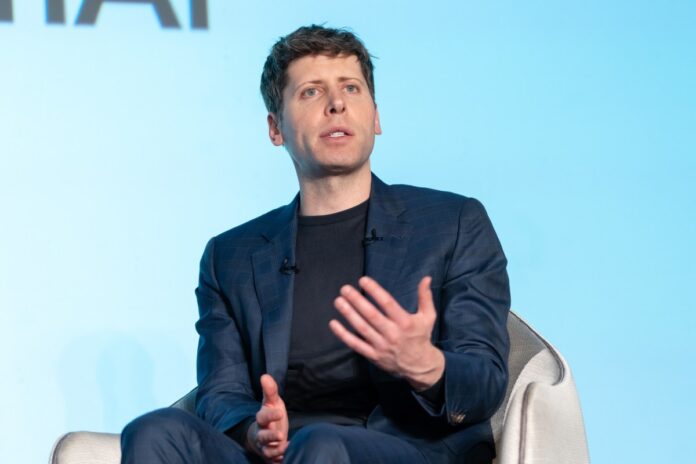Authorized filings submitted earlier this month from attorneys representing OpenAI and Jony Ive’s io reveal new particulars in regards to the corporations’ efforts to construct a mass-market AI {hardware} machine.
The filings are a part of a trademark dispute lawsuit filed this month by iyO, a Google-backed {hardware} startup growing custom-molded earpieces that hook up with different units. Over the weekend, OpenAI pulled promotional supplies associated to its $6.5 billion acquisition of Jony Ive’s io startup so as to adjust to a courtroom order concerned within the swimsuit. OpenAI says it’s combating iyO’s allegations of trademark infringement.
For the final 12 months, OpenAI executives and former Apple leaders now working at io have vigorously researched in-ear {hardware} units, in line with filings submitted in iyO’s lawsuit. In a June 12 filing, attorneys representing OpenAI and io mentioned the businesses bought at the very least 30 headphone units from varied corporations to discover what’s available on the market at this time. In current months, OpenAI and io executives additionally met with iyO’s management, and demoed their in-ear know-how, in line with emails revealed within the case.
That mentioned, OpenAI’s first machine in collaboration with io will not be a pair of headphones in any respect.
Tang Tan, a longtime Apple government that co-founded io and serves because the startup’s chief {hardware} officer, claims in a declaration to the court that the prototype OpenAI CEO Sam Altman talked about in io’s launch video “is not an in-ear device, nor a wearable device.” Tan notes that the design of mentioned prototype in not but finalized, and that the product is at the very least a 12 months away from being marketed or supplied on the market.
The shape issue of OpenAI and io’s first {hardware} machine has largely remained a thriller. Altman merely said in io’s launch video that the startup was working to create a “family” of AI units with varied capabilities, and Ive mentioned io’s first prototype “completely captured” his creativeness.
Altman had beforehand instructed OpenAI’s workers at a gathering that the corporate’s prototype, when completed, would in a position to slot in a pocket or sit on a desk, in line with the Wall Street Journal. The OpenAI CEO reportedly mentioned the machine can be absolutely conscious of a person’s environment, and that it could be a “third device” for customers to make use of alongside their smartphone and laptop computer.
“Our intent with this collaboration was, and is, to create products that go beyond traditional products and interfaces,” mentioned Altman in a declaration to the court submitted on June 12.
Legal professionals representing OpenAI additionally mentioned in a submitting that the corporate has explored a variety of units, together with ones that have been “desktop-based and mobile, wireless and wired, wearable and portable.”
Whereas sensible glasses have emerged because the front-runner for AI-enabled units, with corporations like Meta and Google racing to develop the primary broadly adopted pair, a number of corporations are additionally exploring AI-enabled headphones. Apple is reportedly working on a pair of AirPods with cameras, which might assist energy AI options by gathering details about the encompassing surroundings.
In current months, OpenAI and io executives have achieved appreciable analysis into in-ear merchandise.
On Could 1, OpenAI’s VP of Product, Peter Welinder, and Tan met with iyO’s CEO, Jason Rugolo, to be taught extra about iyO’s in-ear product, in line with an emailed invitation revealed within the case. The assembly befell at io’s workplace in Jackson Sq., the San Francisco neighborhood the place Ive has bought several buildings to work on LoveFrom and io.
On the assembly, Welinder and Tan examined out iyO’s custom-fit earpiece, however have been disenchanted when the product failed repeatedly throughout demonstrations, in line with follow-up emails revealed within the case.
Tan claims in his declaration that he met with Rugolo as a courtesy to his mentor, longtime Apple government Steve Zadesky, who really helpful he take the assembly. Tan additionally claims he took a number of precautions to keep away from studying an excessive amount of about iyO’s IP, equivalent to suggesting that his attorneys evaluate supplies earlier than he does.
Nevertheless, it appeared that OpenAI and io workers thought they may be taught one thing from certainly one of iyO’s companions. To customise its in-ear headsets, iyO despatched a specialist from an ear-scanning firm, The Ear Venture, to somebody’s residence or workplace to get an in depth map of somebody’s ear.
In a single email revealed in the case, Marwan Rammah, a former Apple engineer that’s now working at io, instructed Tan that buying a big database of three-dimensional scans from The Ear Venture might give the corporate a “helpful starting point on ergonomics.” It’s unclear if any such deal befell.
Rugolo tried repeatedly to forge a deeper relationship between iyO, io, and OpenAI — however largely failed, in line with the emails. He pitched OpenAI on launching iyO’s machine as an early “developer kit” for its last AI machine. He pitched OpenAI on investing in iyO and, at one level, even supplied to promote his total firm for $200 million, the filings say. Nevertheless, Tan mentioned in his declaration that he declined these provides.
Evans Hankey, former Apple government turned io co-founder and chief product officer, mentioned in a declaration to the court that io will not be engaged on a “custom-molded earpiece product.”
The ChatGPT-maker appears to be greater than a 12 months out from promoting its first {hardware} machine, which will not be an in-ear product by any means. Given what the corporate mentioned on this lawsuit, it seems additionally it is exploring different kind elements.
#Courtroom #filings #reveal #OpenAI #ios #early #work #machine


